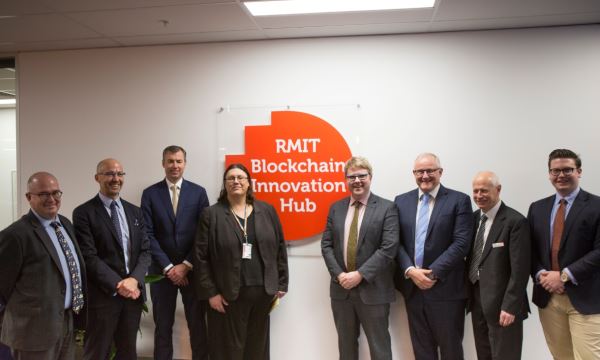RMIT is investing $6 million in its dedicated social science research centre for blockchain, Blockchain Innovation Hub (BIH), to enhance research and education capabilities for its students and ensure they are ready to enter a blockchain-empowered economy.
The BIH will feature a new Blockchain Business Lab, bringing together research expertise from across the University, such as business, law, economics and sociology, to help develop new regulations, skills and capabilities needed by the industry.
New research and teaching collaborations with the Singapore Institute of Management (SIM) and RMIT Vietnam around blockchain will further strengthen RMIT’s global links.
Blockchain Innovation Hub co-director, Dr Chris Berg, said Australia had a unique opportunity to shape the future blockchain economy.
“As the world’s first dedicated social science research centre into blockchain technology, the RMIT blockchain Innovation Hub is leading the way in both research and education,” Mr Berg said.
“Our goal is to ensure that Australian students are ready for life in the blockchain economy and that Australian research makes its mark in this incredibly exciting space.”
Deputy Vice Chancellor (Business & Law) and Vice-President Professor, Julie Cogin, said the investment highlights RMIT’s leading role in the industry.
“Our academics are at the forefront of shaping the blockchain industry internationally, as well as preparing our students with the digital skills of tomorrow,” Ms Cogin said.
The future of blockchain shines bright
Blockchain technology has the ability to cause significant economic and social change.
It is predicted to generate an annual business value of over US$175 billion (A$259.5 billion) by 2025 and more than US$3 trillion (A$4.45 trillion) by 2030.
Blockchain offers a transparent and decentralised way of recording lists of transactions. It has the potential to automate and remove the need for the institutions and services that underpin our lives.
Blockchain can be used in applications such as managing supply chains, protecting health data, and for deploying social services. It also paves the way for ‘smart contracts’, programmed to perform a transaction automatically.
Global research and advisory firm Gartner predicts that by 2023, blockchain will support the global movement and tracking of $US2 trillion worth of goods and services annually.
Australia’s Blockchain roadmap
Seizing the economic opportunities for Australia from blockchain is part of the Government’s goal of being a leading digital economy by 2030.
Last week it released The Australian Blockchain National Roadmap for Australia, setting out signposts for the future to make the most of blockchain technology.
The roadmap highlights various initiatives, which include developing common frameworks for blockchain education, working with Austrade on a capability development program for start-ups, and pilot projects with other countries.
Minister for Industry, Science and Technology, Karen Andrews, believes the roadmap was another important step on the way to helping improve the nation’s productivity.
“The Morrison Government has worked collaboratively with industry and researchers on this roadmap, which outlines what we can do together over the next five years to deliver benefits for our nation from blockchain technologies,” Ms Andrews said.
The roadmap builds on the Government’s investment to develop international standards for blockchain technology.
“Blockchain technology offers great potential to save money, initiate new business and export opportunities, boost economic growth and create new jobs. Governments and private industries all stand to benefit from embracing this technology,” Ms Andrews said.
“Employment opportunities in blockchain are growing substantially, with rapid growth in job advertisements since 2016.”
Benefits for all
The Australian Blockchain National Roadmap showcases opportunities outside the financial sector and explores the wide benefits that can be harnessed through blockchain.
Agricultural exporters, universities and the finance sector are already seeing the benefit of blockchain for tracking a product along the supply chain, checking credentials and transferring customer information.
The National Blockchain Roadmap Steering Committee will oversee the strategies arising from the roadmap, including the establishment of a collaborative model comprising industry, the research sector and government.
National Blockchain Roadmap: Progressing towards a blockchain-empowered future can be viewed here.


